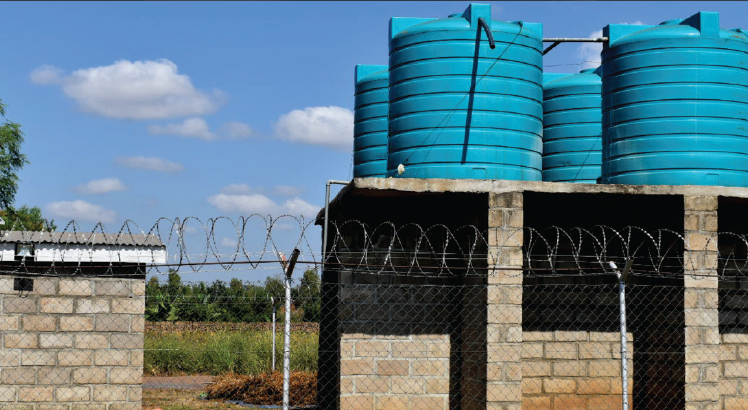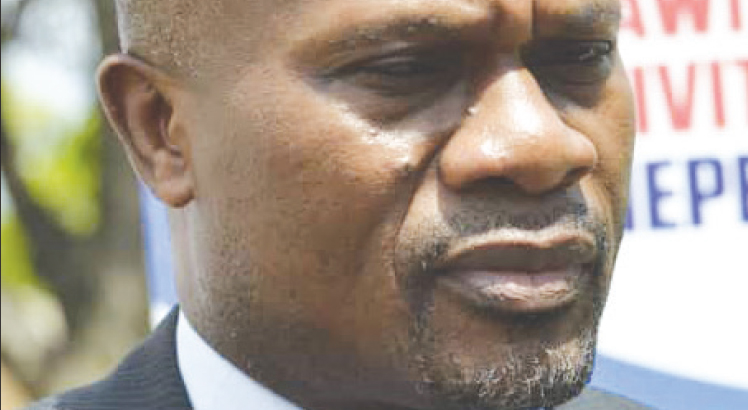As Songani River in Zomba dried up in 2015, Kenneth Sanudi’s hope of a harvest faded.
The 59-year-old had failed to produce enough following a dry spell during the 2014/15 rainy season.
“We experienced prolonged dry spells when maize was just tasseling,” he recalls, “climate change made weather conditions bad to grow maize and hunger was looming as I harvested little.”
Around 90 percent of Malawian farmers depend on rain-fed agriculture, according to World Food Programme (WFP).
The United Nations (UN) agency that fights hunger further says although Malawi has strong national environmental policy, agricultural productivity is constrained by high deforestation rates that increase vulnerability to climatic shocks, rapid population growth and over-reliance on rains.
Part of the solar-powered Chigaru Irrigation Scheme
Like other residents of Namadingo Village, Traditional Authority (T/A) Kuntumanje, Sanudi banked his hopes on irrigation farming.
This had been the food production back-up plan for these communities along the Songani River bank.
Sanudi says with the plan on the rocks, they were doomed.
“Hunger kicked in and we struggled,” he says.
Although irrigation farming had been saving them from grappling with hunger, the father of eight says it was tough to grow crops.
They had to endure a back-breaking task of carrying watering cans from the river to their fields in Chigaru Irrigation Scheme.
Sanudi recounts: “It was tiresome making us to grow crops on small plots that did not give our families enough food until the next harvesting season.”
With the rain-fed agriculture becoming unpredictable, another farmer Adam Bonomali says irrigation farming was the only way to beat hunger and poverty.
“The challenge had been that if there was no water in the river, we could not grow crops and the primitive ways of irrigation could not allow us to realise enough from it,” he says.
However, without relying on Songani River, the two and other 29 farming households in the village are doing irrigation farming free of water challenges. They have left the river’s waters to flow to Lake Chilwa.
Since 2018, they are harvesting thrice a year and have increased their farm plots.
The development follows modernisation of the 17 hectare-scheme under integrated resilience programme implemented by WFP in partnership with Emmanuel International Malawi.
The USaid-funded intervention installed high-yielding pumps using solar-powered systems that sustainably bring water to the farmers’ crops to flourish in the face of increasing climate change.
Sanudi says the initiative has made farming easy and improved their lives for the better.
“I no longer experience hunger since irrigation became simple. I grow crops three times a year,” he brags.
Apart from maize, the initiative has allowed the farmers to grow potato, tomato, egg plants and soya beans.
Earnings from these crops have enabled the farmers to improve their livelihoods, according to Sanudi who is also the scheme’s chairperson.
He has built a five-bedroom house roofed with corrugated iron sheets, bought livestock and provides his family with basic needs.
Bonomali says he has achieved financial freedom with the irrigation farming proceeds.
Glady Dachi, 27, says the system has brought enormous blessings to her life.
“I produce more food than my family needs in a year. Farming is my business now and I am living a better life,” the mother of three said.
To assist farmers realise more proceeds from their production surplus, WFP through the district council buys the crops for its feeding intervention at Nangweka Primary School.
Chisomo Moleni, 24, says he has defeated poverty by selling crops to the school.
“This market offers us brilliant prices way above the government’s farm gate ones set every year. We make a killing while giving the school diversified foods for children’s meals,” states the father of two.
The farmers also thank the initiative for engaging them in manure making and fertiliser multiplication, soil and water management, and crop diversification, among components of conservation agriculture, which enhanced their adaptation to climate change.
This year, the farmers have made K8.9 million for supplying foodstuffs to the school.
Group village head Namadingo said the initiative has improved food security and agricultural productivity among his subjects.
“The sustainable irrigation farming has helped my people to be self-reliant, and have improved nutrition and economic statuses,” he says.
Emmanuel International Malawi director Charles Mukiwa says he is delighted the initiative has transformed lives of the poor and food insecure households.
Elton Mgalamadzi, head of WFP Blantyre sub-office, said they strive to help people have good lives.
He said: “We are pleased our integrated programmes are saving and changing lives. We have built communities’ resilience, allowing them to have enough food and fight poverty.”
The post Eliminating hunger with solar-powered irrigation appeared first on The Nation Online.
 Moni Malawi
Moni Malawi 

